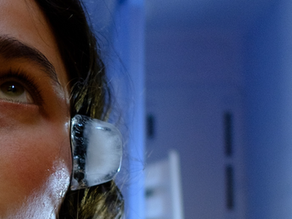top of page

Our Articles on:


On Health Anxiety as an Artist
Eight years ago, I went to a friend of mine in distress. I had a lump or a bump or a cough or a premonition.
“I am dying,” I told her. I was certain of it.
“Or are you just about to put an album out?” she asked.
My name is Charlee, and for the better part of twelve years, I’ve been a willing participant in the love-hate relationship most artists have with the music industry. The music industry is a peculiar trigger in my life. Anytime I move forward, I backwards dance into

Charlee Remitz
3 days ago6 min read


Grieving Stranger Things is grieving my inner child
It’s time to accept it, Stranger Things is finished. We have all become a little bit more adult since Episode 8, which aired on New Year’s Eve.
Why is it so difficult to accept that it is over? This is not a rhetorical question. Thousands of fans online have, for weeks, argued that Episode 8 was not the end. According to the viral “Conformity Gate” theory, fans believed that there should have been a new episode coming out on January 7th.

Carmine Pariante
4 days ago5 min read


Learning to Listen: Sound as an Overlooked Dimension of Architecture
Have you ever thought about sound in the spaces you love to spend time in?
When we talk about what makes a place great, we usually focus on how it looks. We notice the lighting, the materials, the layout. We might even comment on how it smells or feels to the touch. But we rarely think about how a space sounds, even though sound shapes our experience the moment we walk through the door.

Aeron Kim
Jan 95 min read


Creating My Own Holiday Traditions as a Muslim
Growing up Muslim, I didn’t have many holiday traditions, so I learned to create my own. Today, I’m a Seattle-based writer who has learned to create traditions and define home on my own terms. As a kid, I couldn’t sing the words to the season’s greatest hits, didn’t spend the last month of the year shopping for presents, and never set out cookies for Santa. Instead, Christmas was a day when I would pick up extra shifts to cover for co-workers who were out of town to see their

Aleenah Ansari
Dec 19, 20254 min read


An inclusive and relevant pregnancy book is exactly what we need
Pregnancy is expected to be a “one size fits all” phenomenon. Every stereotype of a pregnant person involves peeing on a stick, sharing the happy news with your partner, throwing up every morning, and having a straightforward delivery where you’re screaming out in pain until the miracle of life is pushed out of your body.

Riddhi Laijawala
Dec 18, 20253 min read


Beyond the Glitter: What Does Emily in Paris Show Us About Expat Life?
I have to admit it: I was sceptical when the Netflix show Emily in Paris first came out, which is why I didn’t give it a chance until earlier this year. Surprisingly, that wait proved worthwhile: I binge-watched all four seasons in just a few weeks, and now I’m counting down the days until Season 5 premieres on Netflix on December 18th. However, my enthusiasm is not widely shared, with many strongly dismissing the show for depicting an overly romanticised version of expat li

Francesca Mancino
Dec 2, 20255 min read


Combining culture and cortisol – Is art good for our health?
Writer’s note: This article has been co-written by Courtney Worrell and Tony Woods It has long been said that art is good for our health, but we didn’t know much about how or why. So, this summer, we set up shop in front of the likes of Van Gogh and Manet at the Courtauld Gallery in London to look at the science behind this relationship and explore how the body really responds to viewing art. Spoiler alert – what we found was very, very interesting. Vincent Van Gogh’s Sel

Courtney Worrell
Oct 28, 20255 min read


Binge-Watching: How Our TV Habits Shape Our Brains and Mental Health
Streaming services have dominated the television and film distribution space over the last decade. With its rise, streaming powerhouses like Netflix, Prime Video, and Disney+ brought with them a novel release method: entire seasons aired on the same day, at the same time.

Melisa Kose
Aug 20, 20257 min read


The Impact of Colonisation Shown Through Sinners
As a movie enthusiast, I love a film with powerful themes, and the recently released horror film ‘Sinners’ doesn’t fall short. With all the talk around the movie, I went in blind and don’t regret it one bit.

Suvi Pushpakanthan
Jul 8, 20254 min read


Are We Living 'The Handmaid’s Tale' in 2025?
Being a woman in 2025 feels frightening. During a time when society should be moving forward towards greater equality and empowerment for...

Samrina K Sangha
Jun 5, 20254 min read


What Squid Game Reveals About Power, Division, and Being Human
We are not O or X. We are not built to stay still. Beliefs bend. Allegiances shift. When systems demand certainty, it’s our capacity for...

Aeron Kim
May 20, 20255 min read


The Deep Symbolism of Children’s Movies and the Messages They Carry
I must admit. I am someone in my mid-twenties, but I absolutely love animated movies. I recently went to see a movie called “The Wild...

Riddhi Laijawala
May 1, 20255 min read


Supporting trauma survivors’ through art and science
According to the World Health Organisation (WHO), the majority of people who access mental health services have experienced trauma. Yet, trauma remains misunderstood, misdiagnosed, and mistreated. How then can we best support survivors who need holistic, relatable, consistent, and trauma-sensitive healthcare?

Isaac Ouro-Gnao
Apr 24, 20255 min read


In Focus: How Photography Grounds Me
Photography has always been more than just a hobby for me—it has allowed me to process emotions, navigate difficult moments, and connect...

Isabella Fowden
Mar 27, 20255 min read


The Pain of Neglect: Women's Story of Disassociation
Black and white image from Unsplash As a young woman, I often find myself wondering what my place is. Both in life, what aspirations...

Pierrette Fortuna
Mar 26, 20255 min read


Netflix's Apple Cider Vinegar Puts Sour Taste on Wellbeing Industry
The new Netflix sensation, Apple Cider Vinegar, is inspired by a true story but is not an entirely accurate portrayal, with new...

Courtney Worrell
Mar 4, 20255 min read


Arts & Crafts Help Homeless Survivors Express Their Inner Creativity
Poor mental health is widespread within the homeless community, with homeless people being nearly twice as likely to experience a mental...

Layecha Fidahoussen
Jan 22, 20254 min read


Beyond Prediction: Explaining Astrology's Potential
Picture by Allision Saeng from Unsplash+ As a neuroscientist, I’ve spent my career advocating and advertising for evidence-based...

Klaas Bahnsen
Jan 8, 20255 min read


The power of the stars: What the horoscope says about me.
People have always been so fascinated by the stars , to the point where starts are tasked with determining our way of life or how the day...

Daniela Giallanella
Jan 7, 20254 min read


Romanticising Christmas: The Holiday Magic
And just like that… the holiday season approaches. Another year has gone, with its highs and lows, its lessons, and all its triumphs. As...

Lea Schmid
Dec 19, 20244 min read


Before a Snowflake Falls: A Personal Encounter with Han Kang
Han Kang © Photo: Paik Dahuim. Courtesy of Natur & Kultur. Distance between You and Me Every heart holds a quiet ode to someone—a figure...

Jin-ho Kim
Dec 11, 20245 min read


From Historical Trauma to Literature: The Universal Appeal of Han Kang
The worldwide impact of Korean culture became particularly prominent with Parasite, the 2020 Academy Award-winning film that earned...

Hami Lee
Dec 10, 20244 min read


Old Friends and The Timeless Joy of Rewatching Your Favourite Shows
Like catching up with an old friend or stumbling upon a trinket that you thought you’d lost lifetimes ago...

Melisa Kose
Oct 16, 20246 min read


“What is Your MBTI?”- Inside Personality Testing in South Korea
In South Korea, especially among Gen Z, the MBTI personality test isn’t just a tool for self-discovery—it’s a full-blown social phenomenon. From casual conversations to dating preferences, these four-letter codes are everywhere, and if you’re not familiar with the latest craze, you might feel a bit left out. My name is Aeron. Originally from South Korea, I am a researcher at the Stress, Psychiatry, and Immunology (SPI) Lab at King’s College London. Having lived between the

Aeron Kim
Oct 9, 20245 min read


The Unconditional Nature of Human Worth
A Reflection on Robert Frost’s “The Rose Family” What do I have to be to prove that I am a rose? Hello everyone! My name is Isabella...

Isabella Molnar
Oct 8, 20245 min read


The Mind of Others: A documentary on mental health
Content warning: This article contains mentions of suicidal ideation It starts with a silent video of Winston Churchill with more and...

Carmine Pariante
Jul 26, 20244 min read


From Doodles to Diaries: Navigating Life Through Journaling
Hello reader! I’m Sofia, a twenty-one-year-old bachelor’s student with a passion for Neuroscience. Ever owned a diary? Sceptical about...

Sofia Panzeri
Mar 21, 20244 min read


Reproductive Disorders: The Good, the Bad, and the Artistic
By the time I was diagnosed with endometriosis, I was told that my disease had progressed to moderate organ fusion from scarring and...

Seyi Osobamiro
Mar 19, 20244 min read


Why the Suffering Artist Archetype is so damaging for creatives
The ‘suffering artist’ is a romanticised archetype that has been perpetuated throughout history in literature, film, and popular culture....

Natali Simmonds
Mar 7, 20245 min read


Books for Company: Reading and Wellbeing
Have you ever found yourself on a train or waiting for a friend, and discovered you don’t have a book on you? The horror! I always keep a...

Alison Waller
Mar 5, 20245 min read
bottom of page





